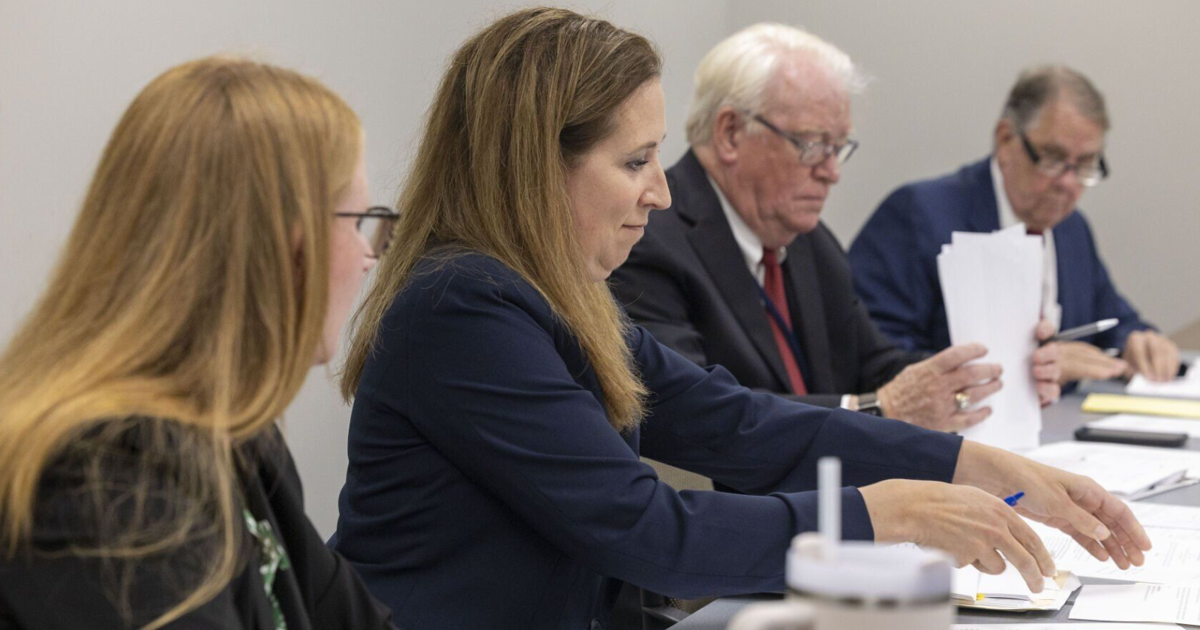
LINCOLN — When Nebraska voters legalized medical cannabis last year, they set Oct. 1, 2025 as the date that the state must start approving licenses for businesses to participate in the system.
That’s not going to happen.
The commission met Tuesday ahead of that deadline, but because of the recent resignation of two members of the five-member board, the remaining commissioners had not fully reviewed the applications. Chair Monica Oldenburg said there were 39 applications for cultivator licenses — the commission decided earlier this month it will approve only four.
October will be a pivotal month for the trajectory of Nebraska’s medical cannabis program.
The remaining commissioners will meet Tuesday to approve cultivator applications. The applications have already been put through a lottery, and commissioners will each grade them to determine which will be selected.
Then the commission will have a public hearing Oct. 15 about proposed permanent regulations for medical cannabis.
Finally, through Oct. 17, Gov. Jim Pillen is also accepting applications for two open positions on the Liquor Control Commission, and those individuals will automatically serve on the Medical Cannabis Commission.
The commission’s rules have received nearly universal criticism from meeting attendees, who have called the rules too restrictive and in violation of what 71% of voters supported.
Limitations include the number of cultivator licenses and the number of plants they can grow. The rules also bar edibles, smoking, vaping, and possession of cannabis flower — the ballot initiative specifically doesn’t limit delivery methods or possession of any part of the plant.
“The commission is not implementing the law. You are rewriting it, and that exceeds your authority,” Lincoln resident Angelica Marsaglia said at the meeting.
She and others implored the commission to listen to patients and voters and accused them of taking direction from prohibitionists in the executive branch and Legislature who have slowed progress toward legalizing medical cannabis for years. Gov. Jim Pillen ultimately picks who is on the commission, with legislative approval, and signs off on regulations.
During an hour-long public comment period at Tuesday’s meeting, many speakers credited former Commissioner Bruce Bailey for his willingness to break from the majority and discuss less restrictive regulations, such as allowing more licenses and permitting vaping.
Dominic Gillen of Bellevue said Bailey was “honoring his commitment to voters” and “should be hailed as a hero for upholding his principles.” Lia Post, of Springfield, said Bailey seemed to be the only commissioner who saw her humanity and considered people’s health struggles.
Bailey and Commissioner Kim Lowe served on the Medical Cannabis Commission through their membership on the Liquor Control Commission. Pillen asked them both to resign last week, and they complied.
Lingering over the commission’s business is recent news that Hobert Rupe, former director of the Liquor Control Commission, faces corruption charges and is accused of receiving cash and sexual favors at two Lincoln strip clubs in exchange for tipping off the owner about law enforcement investigations related to the establishments.
Pillen will now appoint two new liquor control commissioners, who will also serve on the Medical Cannabis Commission. He appointed Oldenburg and Lorelle Mueting to the Medical Cannabis Commission and J. Michael Coffey to the Liquor Control Commission in recent months.
Speakers at the meeting continued to implore the commission to set rules closer to the ballot initiative.
John Reagan of Omaha said, “There are people suffering tremendously, and the way that you all are taking this and turning it is wrong. We won.”
He also said the people voted for flower and vaping, and “if we don’t get this changed, I will be one of the first ones out there getting signatures to make this legal,” echoing a common prediction that a restrictive medical program will lead to recreational legalization.
“Please stand up for the 71% of people who voted for this. … Just because you voted against it, doesn’t mean it’s wrong,” Reagan said.
Marci Reed brought six pill bottles with her to show the medication her 12-year-old son takes daily to treat ADHD and epilepsy, along with emergency medicine for seizures. She worries about the long-term side effects, but feels she has no other options.
“It’s too much medicine to take daily,” she said. “Getting him something more natural is so much better than putting this in his system daily.”
Get Government & Politics updates in your inbox!
Stay up-to-date on the latest in local and national government and political topics with our newsletter.
* I understand and agree that registration on or use of this site constitutes agreement to its user agreement and privacy policy.
Josh Reyes
Get email notifications on {{subject}} daily!
Your notification has been saved.
There was a problem saving your notification.
{{description}}
Email notifications are only sent once a day, and only if there are new matching items.
Followed notifications
Please log in to use this feature
Log In
Don’t have an account? Sign Up Today



